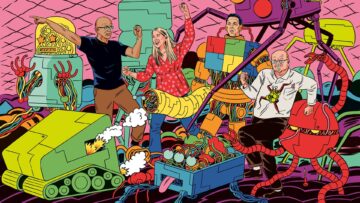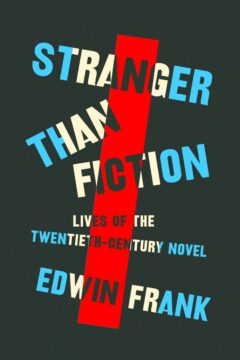Sean Carroll at Preposterous Universe:
 The number of neurons in the human brain is comparable to the number of stars in the Milky Way galaxy. Unlike the stars, however, in the case of neurons the real action is in how they are directly connected to each other: receiving signals over synapses via their dendrites, and when appropriately triggered, sending signals down the axon to other neurons (glossing over some complications). So a major step in understanding the brain is to map its wiring diagram, or connectome: the complete map of those connections. For a human brain that’s an intimidatingly complex challenge, but important advances have been made on tinier brains. We talk with Jeff Lichtman, a leader in brain mapping, to gauge the current state of progress and what it implies.
The number of neurons in the human brain is comparable to the number of stars in the Milky Way galaxy. Unlike the stars, however, in the case of neurons the real action is in how they are directly connected to each other: receiving signals over synapses via their dendrites, and when appropriately triggered, sending signals down the axon to other neurons (glossing over some complications). So a major step in understanding the brain is to map its wiring diagram, or connectome: the complete map of those connections. For a human brain that’s an intimidatingly complex challenge, but important advances have been made on tinier brains. We talk with Jeff Lichtman, a leader in brain mapping, to gauge the current state of progress and what it implies.
More here.
Enjoying the content on 3QD? Help keep us going by donating now.


 In 2016, an essay arrived in our offices from John J. Lennon, then incarcerated at Attica Correctional Facility in New York. “
In 2016, an essay arrived in our offices from John J. Lennon, then incarcerated at Attica Correctional Facility in New York. “ Jaime Teevan joined
Jaime Teevan joined
 Trump’s political rebirth is unparalleled in American history. His first term ended in disgrace, with his attempts to overturn the 2020 election results culminating in the attack on the U.S. Capitol. He was shunned by most party officials when he announced his candidacy in late 2022 amid multiple criminal investigations. Little more than a year later, Trump cleared the Republican field, clinching one of the fastest contested presidential primaries in history. He spent six weeks during the general election in a New York City courtroom, the first former President to be
Trump’s political rebirth is unparalleled in American history. His first term ended in disgrace, with his attempts to overturn the 2020 election results culminating in the attack on the U.S. Capitol. He was shunned by most party officials when he announced his candidacy in late 2022 amid multiple criminal investigations. Little more than a year later, Trump cleared the Republican field, clinching one of the fastest contested presidential primaries in history. He spent six weeks during the general election in a New York City courtroom, the first former President to be  Annie Rauwerda: I started back in high school editing typos and adding things that I noticed were missing — like items to lists. But I had never done anything more than that because I was afraid of it because there are so many rules. Like, I’d seen the talk pages. And many of Wikipedia’s policies and guidelines and essays are very wordy.
Annie Rauwerda: I started back in high school editing typos and adding things that I noticed were missing — like items to lists. But I had never done anything more than that because I was afraid of it because there are so many rules. Like, I’d seen the talk pages. And many of Wikipedia’s policies and guidelines and essays are very wordy. An optical fibre technology can help chips communicate with each other at the speed of light, enabling them to transmit 80 times as much information as they could using traditional electrical connections. That could significantly speed up the training times required for large artificial intelligence models – from months to weeks – while also reducing the energy and emissions costs for data centres.
An optical fibre technology can help chips communicate with each other at the speed of light, enabling them to transmit 80 times as much information as they could using traditional electrical connections. That could significantly speed up the training times required for large artificial intelligence models – from months to weeks – while also reducing the energy and emissions costs for data centres. In the fall of 2012, when Hayat Tahrir al-Sham (HTS), the military power now in charge of Syria, was a mere minor terrorist organization, a band of their fighters in Aleppo took me prisoner. Back then they were known as Jabhat al-Nusra. I remained in the group’s custody for two years—often in solitary confinement cells, but not always. During this time, it often happened that news of some stupendous victory would make its way, via the fighters’ two-way radios, into our prisons. It was a surreal experience then to listen as a government checkpoint got blown into the sky, for instance, or a truckload of government troops fell into my captors’ hands.
In the fall of 2012, when Hayat Tahrir al-Sham (HTS), the military power now in charge of Syria, was a mere minor terrorist organization, a band of their fighters in Aleppo took me prisoner. Back then they were known as Jabhat al-Nusra. I remained in the group’s custody for two years—often in solitary confinement cells, but not always. During this time, it often happened that news of some stupendous victory would make its way, via the fighters’ two-way radios, into our prisons. It was a surreal experience then to listen as a government checkpoint got blown into the sky, for instance, or a truckload of government troops fell into my captors’ hands. The thing that had precipitated Warner into the literary limelight, and earned her quite a lot of money, was her novel of 1926, Lolly Willowes. As an assertion of female autonomy and idiosyncrasy, it was both timely and captivating. It was also prescient, with its theme of decamping to the country about to be enacted in the life of its author (though perhaps without so sorcerous a resolution). Laura (Lolly) Willowes is a wry old-maidish lady occupying a rather put-upon role in the London household of her married brother, when she suddenly takes flight to a hamlet in the Chilterns called Great Mop, enters into a compact with the Devil and becomes a witch. Despite its subject matter, the book is not excessively whimsical – or its whimsey is tempered by a stern ironic overtone. A style at once mischievous and elegant is one of Warner’s hallmarks, whether it’s applied to a mediaeval nunnery beset by money worries (The Corner That Held Them, 1948), the beguiling and ruthless Cat’s Cradle Book (1960), or the distinctly unfairylike Kingdoms of Elfin (1977), her last subversive flight-of-fancy, carried out with an eldritch inventiveness.
The thing that had precipitated Warner into the literary limelight, and earned her quite a lot of money, was her novel of 1926, Lolly Willowes. As an assertion of female autonomy and idiosyncrasy, it was both timely and captivating. It was also prescient, with its theme of decamping to the country about to be enacted in the life of its author (though perhaps without so sorcerous a resolution). Laura (Lolly) Willowes is a wry old-maidish lady occupying a rather put-upon role in the London household of her married brother, when she suddenly takes flight to a hamlet in the Chilterns called Great Mop, enters into a compact with the Devil and becomes a witch. Despite its subject matter, the book is not excessively whimsical – or its whimsey is tempered by a stern ironic overtone. A style at once mischievous and elegant is one of Warner’s hallmarks, whether it’s applied to a mediaeval nunnery beset by money worries (The Corner That Held Them, 1948), the beguiling and ruthless Cat’s Cradle Book (1960), or the distinctly unfairylike Kingdoms of Elfin (1977), her last subversive flight-of-fancy, carried out with an eldritch inventiveness. A
A Nicole Kidman’s eyes widened. “Haven’t you been to the Rockettes?” she asked. “I go every year. Oh yeah, I’m obsessed!”
Nicole Kidman’s eyes widened. “Haven’t you been to the Rockettes?” she asked. “I go every year. Oh yeah, I’m obsessed!” “So strong is the belief in life what is most fragile in life–real life, I mean–that in the end this belief is lost.” This is the first sentence of André Breton’s famous, infamous, notorious, and rarely actually read first Surrealist Manifesto. Breton was born in a small town in Normandy, France in 1896. He was thus a very young man at the outbreak of WWI. As for nearly everyone of that generation, the war was a defining and devastating experience. I myself had an obsession with learning about WWI around ten years ago. I remember reading some first-person accounts of soldiers describing the experience of gas attacks in the trenches of the Western Front. I had to put the book down. It was one of the few times in my life that I found myself literally unable to read through my tears.
“So strong is the belief in life what is most fragile in life–real life, I mean–that in the end this belief is lost.” This is the first sentence of André Breton’s famous, infamous, notorious, and rarely actually read first Surrealist Manifesto. Breton was born in a small town in Normandy, France in 1896. He was thus a very young man at the outbreak of WWI. As for nearly everyone of that generation, the war was a defining and devastating experience. I myself had an obsession with learning about WWI around ten years ago. I remember reading some first-person accounts of soldiers describing the experience of gas attacks in the trenches of the Western Front. I had to put the book down. It was one of the few times in my life that I found myself literally unable to read through my tears. As Donald Trump gets ready to return to the White House on Jan. 20, he must be prepared to tackle one issue immediately: the possibility that the spreading avian flu might mutate to enable human-to-human transmission.
As Donald Trump gets ready to return to the White House on Jan. 20, he must be prepared to tackle one issue immediately: the possibility that the spreading avian flu might mutate to enable human-to-human transmission.